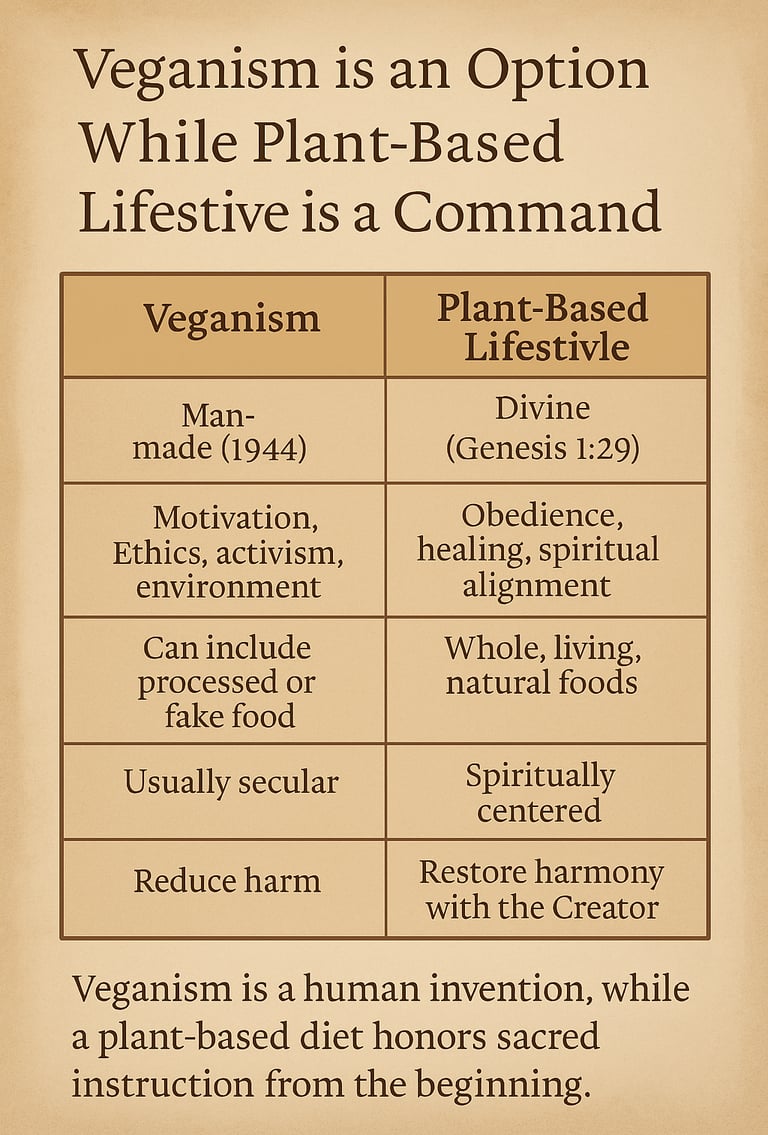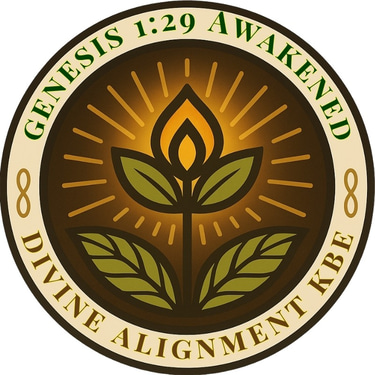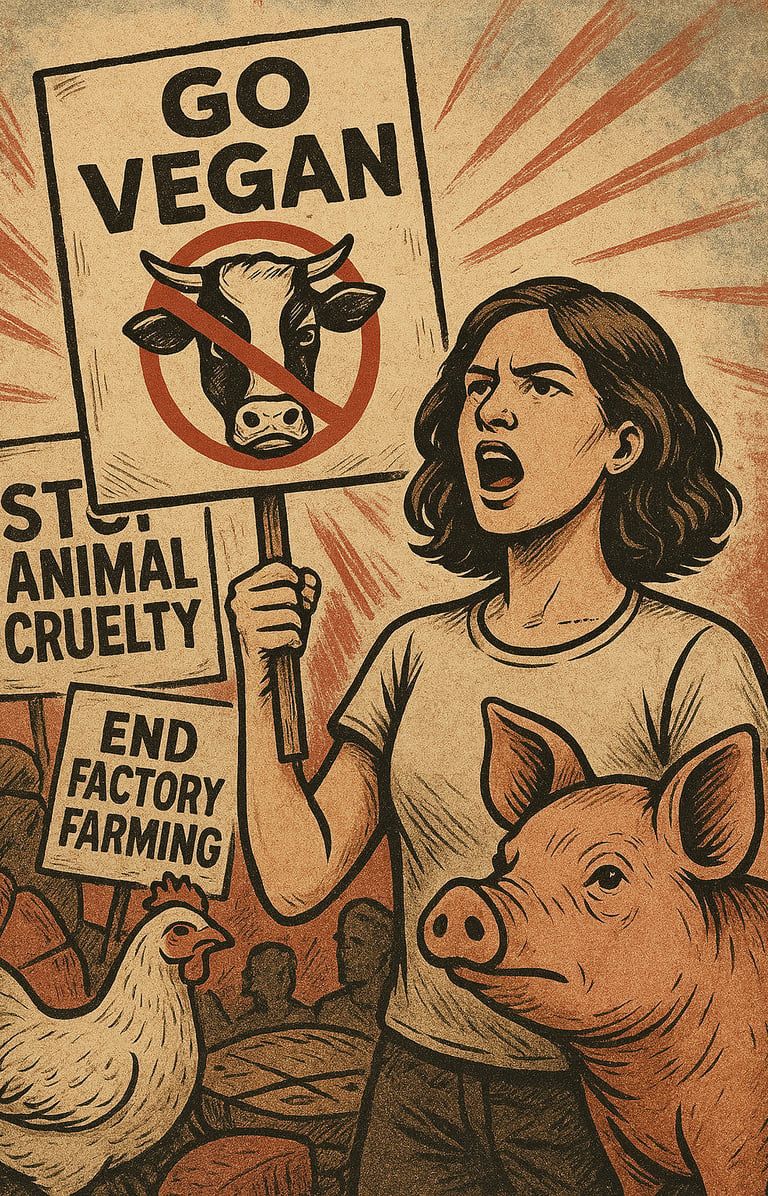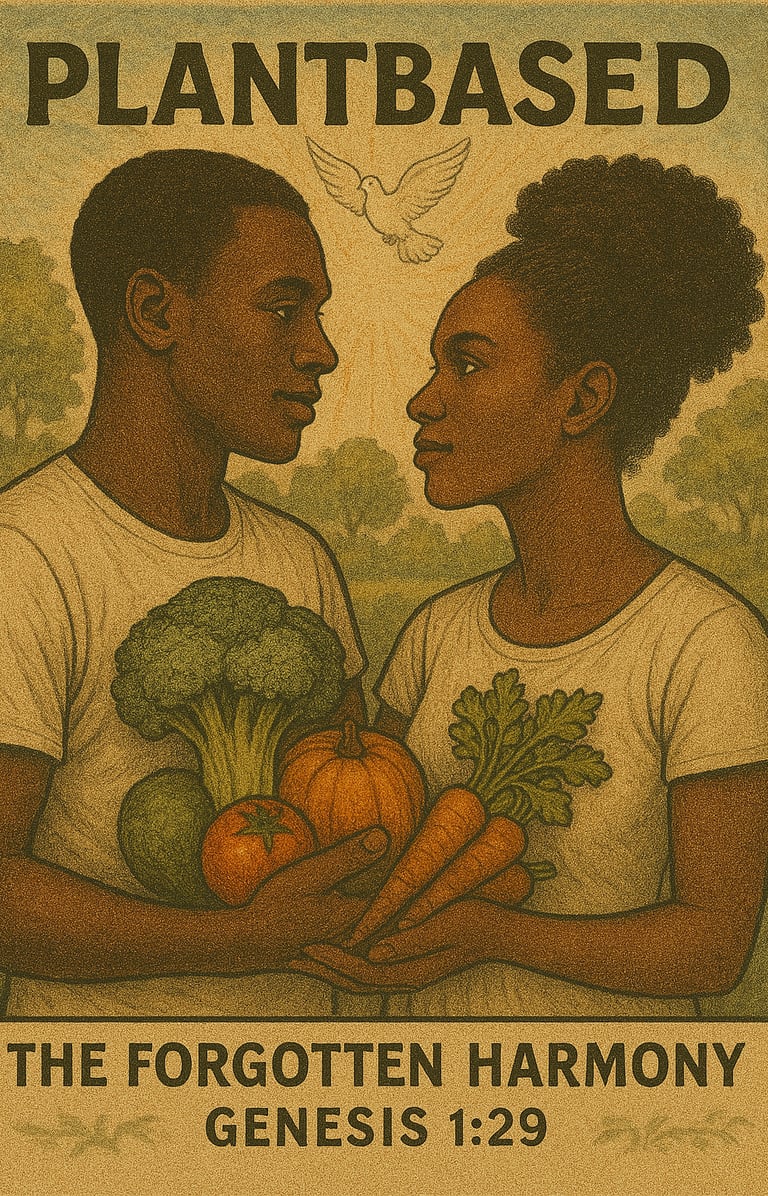Veganism vs. Plant-Based: Two Paths. One Heart. Different Destinies.
Is saving animals enough to save ourselves? Veganism and plant-based living may look alike on the surface—but their roots grow in very different soil. One is a divine instruction forgotten by most; the other, a deliberate inversion of that truth. But what if the difference goes deeper than diet? In this post, we uncover the hidden divide between modern moralism and ancient alignment—and why returning to the Creator’s original design may hold the key to true restoration in a world gone off course.
Tharakazayah (Terrance Lewis)
4/8/20255 min read
Veganism vs. Plant-Based Living: Not All Good Deeds Are God-Given
“For I bear them record that they have a zeal of God, but not according to knowledge.
For they being ignorant of God's righteousness, and going about to establish their own righteousness, have not submitted themselves unto the righteousness of God.” Romans 10:2–3 (KJV)
While veganism continues to grow in popularity, especially among secular and activist communities, few within modern Christianity and Catholicism recognize that the original divine diet was clearly outlined in Genesis 1:29.
In today’s culture, the terms vegan and plant-based are often used interchangeably. For many, they simply mean “not eating meat.” But beneath the surface lies a much deeper divide—one based on intention, vibration, and alignment with divine truth. While veganism is often rooted in activism and human ethics, plant-based living traces all the way back to the Creator's original instruction in Genesis 1:29.
This blog breaks down the difference, why it matters, and why returning to the Edenic path is not a trend—it’s obedience.
What is Veganism?
The word “vegan” was coined in 1944 by Donald Watson, founder of the Vegan Society. It was derived by taking the first and last parts of the word “vegetarian” (VE-GAN), signifying the beginning and end of vegetarianism.
Veganism is a secular philosophy that seeks to eliminate the use of animal products for ethical, environmental, or personal reasons. It extends beyond food to things like leather, wool, animal-tested products, and entertainment involving animals.
But veganism, for all its intent, is man-made. It is a lifestyle based on choice—not one rooted in obedience to the Most High.
Many vegans avoid meat for ethical reasons, but still consume heavily processed, lab-created, or artificial foods that have little to do with health—or divine order.
If the Creator already gave us Genesis 1:29, why did veganism need to be invented in 1944?
The truth is—it didn’t.
The Edenic, plant-based lifestyle is not a new invention. It is a divine commandment that predates every religious denomination and every diet trend. But when church institutions ignored Genesis 1:29 and embraced man-made traditions—including flesh eating and animal sacrifice—a vacuum was created.
Into that vacuum, the world introduced “veganism”—a humanist substitute for a divine instruction.
They took what was holy, reduced it to a trend, and stripped it of its spiritual power.
What is a Plant-Based Lifestyle?
Unlike veganism, a plant-based lifestyle is about more than abstaining from animal products—it’s about returning to natural living, honoring the body as a temple, and realigning with the frequency of life.
It focuses on whole, living foods that nourish both the body and the soul—fruits, vegetables, seeds, nuts, herbs, and pure water.
Plant-based living is not simply about avoiding harm—it’s about embracing life, as originally intended by the Creator.
It’s grounded in:
Genesis 1:29 (divine instruction)
Healing the body
Heightening spiritual discernment
Detoxing from both physical and spiritual impurities
Reconnecting with the Earth and its sacred rhythm
Shared Values—Different Roots
The Forgotten Instruction:
Genesis 1:29
“And God said, Behold, I have given you every herb bearing seed... and every tree, in which is the fruit of a tree yielding seed; to you it shall be for food.”
— Genesis 1:29
This wasn’t a suggestion. It was a commandment—given before sin, before death, before sacrifice. It was part of the divine blueprint for life on Earth.
Religious institutions left this verse intact, yet built doctrines that ignore it entirely. And by replacing divine order with tradition, they led millions away from alignment.
The result? A world plagued by disease, violence, and confusion—all stemming from the same rebellion: “You may surely eat… but not that.”
Where Veganism Falls Short
Though often well-intentioned, veganism:
Lacks spiritual foundation
Treats diet as activism rather than worship
Opens the door to artificial substitutes over living food
While veganism seeks to protect animals, it often disconnects people from the Creator of life and undermines His authority—turning compassion into a cause and animals into unconscious idols.
It’s a step in the right direction, but it’s not the destination. It lacks the covenant law behind the choice.
Why Plant-Based Living Aligns with Divine Order
Plant-based living:
Honors the Creator’s original instruction
Cleanses the body and opens the spirit
Raises vibrational frequency
Restores our connection to creation as a whole
Respects life without needing to reinvent morality
This isn’t just a “lifestyle”—this is a return to divine natural law instituted from the very beginning .
Final Thoughts: More Than Labels
Don’t get caught up in the label wars. Vegan, plant-based, fruitarian—it doesn’t matter what it’s called if it’s not rooted in truth.
“Put on the whole armour of God, that ye may be able to stand against the wiles of the devil.” — Ephesians 6:11 (KJV)
Here’s a breakdown:
"Wiles" means trickery, deceit, or cunning strategies.
The verse is urging believers not to be deceived or overcome by the devil’s subtle tactics, but instead to equip themselves spiritually with God’s truth, righteousness, and faith — which is further explained in the verses that follow.
What matters is this: Are we walking in obedience to the Most High? Are we living by the instruction He gave from the beginning?
"And the great dragon was cast out, that old serpent, called the Devil, and Satan, which deceiveth the whole world: he was cast out into the earth, and his angels were cast out with him." — Revelation 12:9 (KJV)
This verse is deep and symbolic. It identifies:
The great dragon / old serpent – A reference to Satan, tracing all the way back to the serpent in the Garden of Eden.
"Which deceiveth the whole world" – Emphasizes that his deception is global and far-reaching.
Cast out into the earth – Indicates that he was removed from his heavenly position and is now operating on Earth.
His angels – The fallen angels who followed him in rebellion.
Whether someone starts as vegan or comes to plant-based living through health struggles, the invitation is the same:
Return. Realign. Restore.
🔗 Ready to Go Deeper?
📖 Check out our blog on Genesis 1:29 for more context
📘 Read Meat-Eaters and Their Fate: Why Carnal Appetites Block Heaven’s Gates
🌿 Follow our Gospel of the Nazarenes Study on Pinterest
Thanks for reading, Abundance & Gratitude!
Your Guide and Fellow Traveler
Terrance Lewis


We’d love to hear from you!
At Divine Alignment KBE, your voice matters. Drop a comment below to share your thoughts, insights, or questions—you never know who you might inspire! And if this blog spoke to you, feel free to share it with others on the journey.
Quick reminder: Let’s keep it respectful, kind, and uplifting. Comments that go against the spirit of Divine Alignment—like negativity, spam, or disrespect—will be removed. We’re here to build, not break!
Thanks for being part of the movement!
Inspiration
Empowering your spiritual journey through transformative insights.
Harmony
Growth
© 2025 Divine Alignment KBE. All Rights Reserved.
Walking in Kingdom order, not corporate control.
📧 Contact: tl@divinealignmentkbe.com
📍 Based in the United States | Serving ministries nationwide
Disclaimer:
Divine Alignment KBE is not a law firm and does not provide legal or tax advice. All information and services are shared in good faith, based on personal experience, public records, and lawful research of 508(c)(1)(A) ministry structures. For specific legal or tax matters, please consult a licensed attorney or CPA.
🔗 [Terms & Conditions] | [Privacy Policy] |




